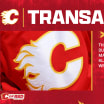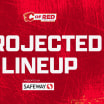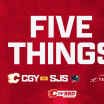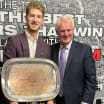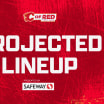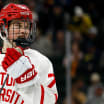In eulogizing his friend, his brother, the day of the funeral, in trying to control his grief in addressing family and friends, the remembrances swung around, as they invariably did, to the game.
"I talked about how he knew my stats better than I did,'' Jon Gillies is recalling. "He was a walking stat encyclopedia. One of those guys. He knew them all. Quite impressive, actually.''
Gillies inspired by late best friend
Jon Gillies' friendship with Brendan Horton serves as constant inspiration
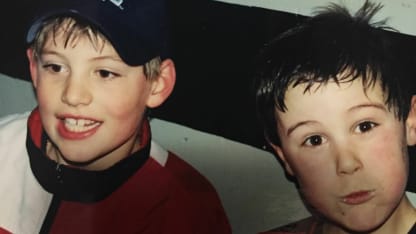
By
George Johnson @GeorgejohnsonCH / CalgaryFlames.com
In eulogizing his friend, his brother, the day of the funeral, in trying to control his grief in addressing family and friends, the remembrances swung around, as they invariably did, to the game.
"I talked about how he knew my stats better than I did,'' Jon Gillies is recalling. "He was a walking stat encyclopedia. One of those guys. He knew them all. Quite impressive, actually.
"And where I was concerned he was always playing devil's advocate with 'em.
"If I had a good game, his first text would be something negative, about - quote - keeping my head small - unquote. Bringing me back down to earth; keeping me balanced.
"If I had a bad game, he'd tell me again that I was his favourite goalie, pump up my confidence.
"He was always there for me, looking out for my best interests.
"Do I think about him? All the time. Only every single day."
On the day of the funeral, March 14th, Gillies, the Calgary Flames' blue-chip goaltending prospect, tweeted out: "When you die, it does not mean you lose to cancer. You beat cancer by how you live."
Brendan Horton personified that.
In keeping, Gillies is now determined to put a year of frustration and tragedy behind him.
Season-ending hip surgery, seven starts into his first pro season, at AHL Stockton. Followed by the deterioration and death of his best friend, gone far, far too soon, aged 21.
"It's sounds crazy to say that an injury could in any way be a positive,'' says Gillies, the 75th selection of the 2012 entry draft. "But my injury gave me the chance to spend the last month of Brendan's life with him.
"I never believed much in fate before …"
They met at five years old, Gillies and Horton, in South Portland, Maine. Through hockey, naturally. Owing to an unstable family situation, Horton quickly became a surrogate sibling, lived with the Gillies clan for a spell, a constant welcome presence in their home and in Jon's life.
The boys played six years of organized baseball together, too, until Brendan opted to concentrate on the diamond, Jon the ice surface.
"We always referred to ourselves as brothers,'' says Gillies. "Almost immediately, actually. It just, I dunno … came naturally.
"Second nature, really.
"We started car-pooling, giving him rides to practices and games. My family was a big driving family. My dad always drove to places, when our games were in Massachusetts, about an hour and a half away from our house.
"So we spent a lot of time together in hotel rooms and the back seat of my dad's truck. We pretty much grew up together.
"We pretty much fought about everything. Like brothers do. I was pickier about things. I don't want to say I was a crybaby back then … but I was more serious. He was a jokester. Could laugh anything off.
"You could hit him as hard as you wanted and he'd just kinda smile at you.
"We were complete opposites. But we got along."
Normalcy ended, the world began to slowly unravel, in Horton's sophomore year of high school. He was diagnosed with Synovial sarcoma, a form cancer which usually occurs near to the joints of the arm, neck or leg.
It's regarded as one of the rarest forms of soft-tissue cancer in the world.
"We were pretty young when he was diagnosed. When you're that young, you think 'He'll beat this.' You don't believe anything bad can happen. Then as you start to get older, one thing doesn't work and the next thing doesn't work, then you start to wonder, to worry.
"It was … hard.
"When he was in hospice, he had his hospital bracelet on. On the bracelet there's the total number of days he'd spent in hospital. I can't remember the exact number but I'm sure it had three or four digits.
"He'd been through a lot. He'd battled hard. So hard. When he was in hospice, they couldn't get the medicine right because his body had built up such a tolerance to what they were trying to give him to keep him comfortable.
"The pain he had, that was the toughest thing to see.
"Something like that just changes your perspective of any aspect of life.
"A few different times over the years he was given months to live, various time frames, and pretty much defied all odds. Finally, last spring, he decided there was nothing left medication-wise to help.
"He was doing clinical trials but decided to stop all medicines to try and live the best he could for whatever time he had left."
Tweet from @JGillies32: Favorite mask yet. Always need my biggest fan with me #brotherhood #BStrong ���������� pic.twitter.com/y3StYiDm7z
Before his condition began to worsen Brendan had been residing with his girlfriend and her family, and they all made the trek to Boston on April 11, 2015 to watch Gillies and the underdog Providence Friars win the NCAA championship, 4-3 over Boston University in front of 18,000-plus at TD Garden.
A 49-save, title-clinching performance netted the rangy goaltender an MVP nod at the prestigious Frozen Four.
"I remember I had a lot of media and stuff after that game. It took forever. When I went in to shower the whole team had already gone.
"So it was late.
"I finally came out into the lobby and Brendan was pumped; he had more energy than any of us. At 11:30. Always a smile on his face. You could never get him down.
"You never heard him complain about the hand he'd been dealt. Never made excuses.
"That's why his story inspires so many people."
Heading into this season, Gillies - the projected "next one" between the Calgary pipes - aims to put his career back on track as a new dawn beckons with Glen Gulutzan as head coach and the acquisition of veteran Brian Elliott from St. Louis impacts what had been an up-in-the-air goaltending situation with the big club.
That's a possibility Gillies has no say in.
"Last year was … well, it was tough. I won't lie. Going into camp my hip hurt worse and worse. Wasn't in the best shape; the kind of shape I wanted to be in.
"Then the surgery. Bad luck? I don't like to use circumstances as an excuse. Especially when it comes to hockey. A bad day playing the game is better than a good day for a lot of people.
"I'm not going to dwell on what might or might not happen. I just want to be playing at my best again.
"I'm excited to be back, feeling good, and having fun with hockey again. I can't even remember the last time I played a game, it's been that long.
"It's been a lot to take in, this last year. But I have a great family, support system, around me. Unfortunately we've dealt with a lot of cancer over the years.
"So my parents more than me kept pressing the right buttons, keeping me going until I could figure it out on my own."
The toughest year of all, you have to believe, is already behind him, at 22.
There will be no post-game texts waiting on his phone anymore. That will be tough.
But wherever he travels on the journey, however far this game may take him, Gillies knows someone somewhere is keeping stats, only too happy to play devil's advocate; a voice in his ear keeping him balanced, looking out for his best interests.
"Sounds cliche, I guess; kind of overly-melodramatic, maybe, but now I feel like I'm playing for two people now, not just one.
"Not just me.
"And if anything, that gives me even more motivation moving forward."




